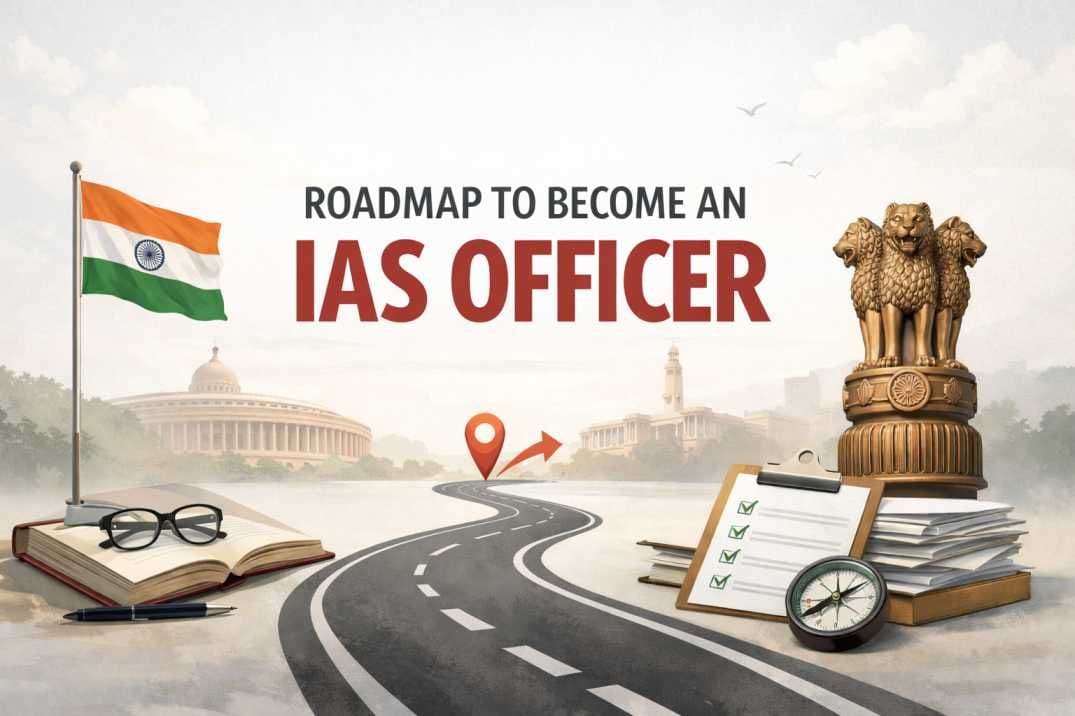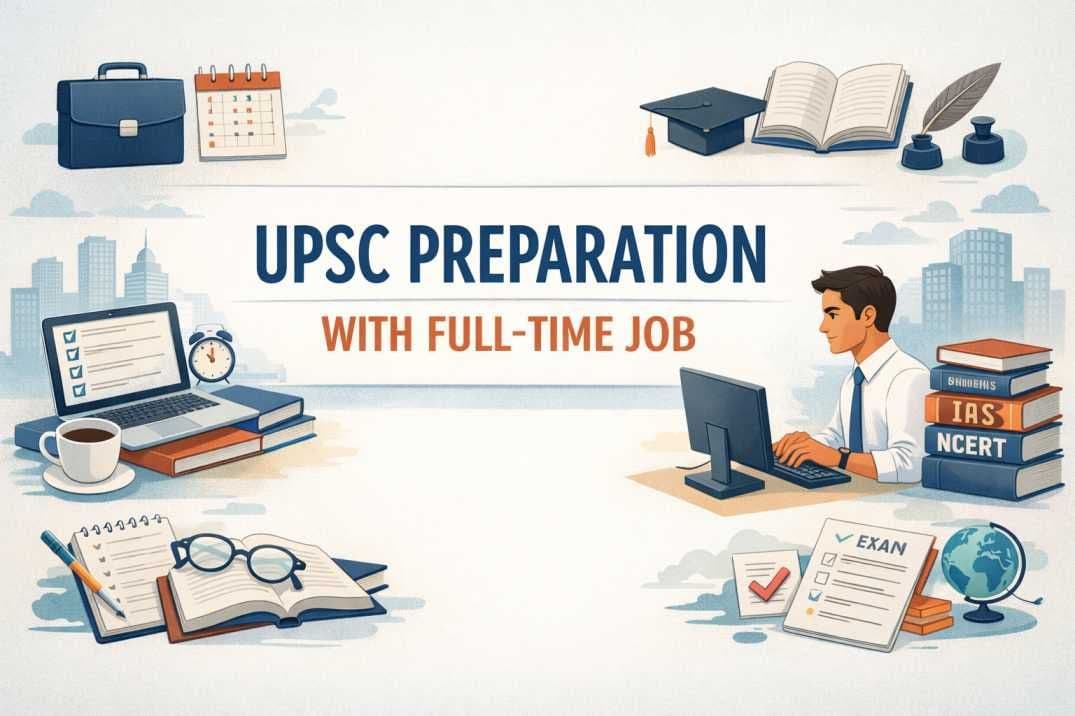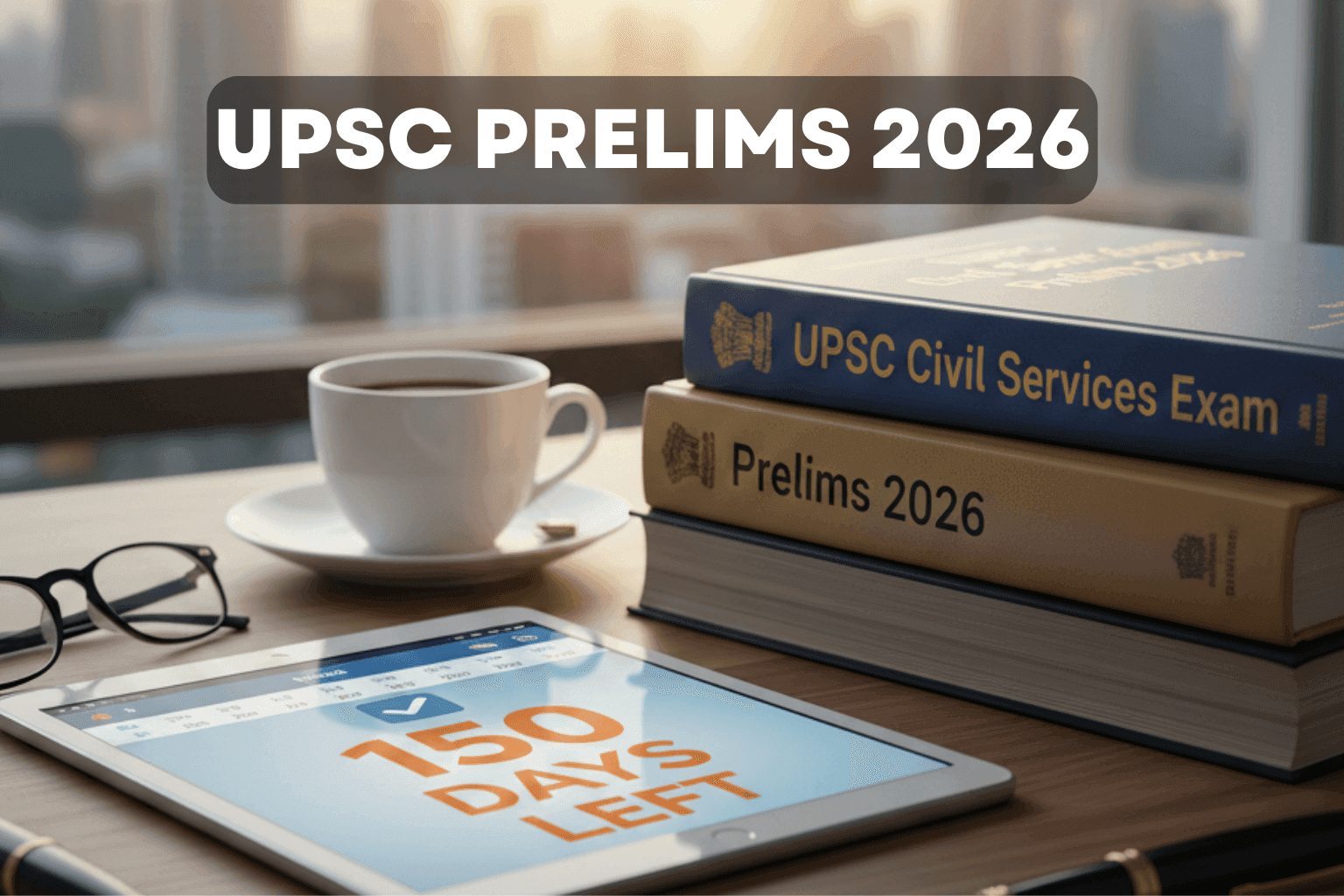1 Year Plan for UPSC Preparation and Study
Feb, 2025
•8 min read
“The only person you are destined to become is the person you decide to be."
- Ralph Waldo Emerson
It’s all about the choices you make, not preordained limits. Just like Kanishak Kataria, a data scientist in Bangalore, who defied expectations by topping the UPSC in 2018 – in his very first attempt!
Exciting, right? You should be! While it demands hard work and focus, conquering the UPSC within a year is a very real possibility.
In this blog, we'll cover understanding the syllabus, creating a rock-solid 1 year strategy for UPSC, and mastering revision techniques – all to ensure UPSC success within a year.
Boost Your UPSC Prep with a 1 Year Strategy
So, you're aiming to become an IPS officer, an IRS officer, or lead a key government department? Whatever the role, tackling the prestigious UPSC exam requires a clear direction. That's where a powerful 1 year strategy for UPSC steps in.

Here's how a 1 year strategy for UPSC supercharges your preparation:
- Laser Focus: No more scrambling – a clear plan keeps you on track and avoids wasting time on irrelevant topics.
- Time Management: Manage time efficiently. This 1-year strategy ensures each month is used productively, minimizing wasted hours.
- Motivation: Clear milestones keep you energized and focused on your UPSC dream.
- Exam Readiness: Practice with confidence, knowing you've covered all the bases.
- Stress Buster: A structured plan reduces exam anxiety by providing a sense of control and preparedness.
- Confidence Booster: Enter the exam hall feeling empowered, knowing you've followed a winning strategy.
Now that you're pumped, let's get to actually creating that essential study plan.
Understanding the UPSC Examination Pattern
Your 1 year strategy for UPSC starts with a deep dive into the syllabus. It's the blueprint for the entire exam, outlining the topics you need to master. The UPSC Civil Services Exam is a two-stage battle:
Prelims (Objective Screening):
- Two papers: General Studies & CSAT (aptitude)
- 100 questions each, 2 marks per question (total 400 marks)
- 2 hours (120 minutes) for each paper
You need to clear the Prelims to advance to the Mains.
Also watch: DIRECT Questions in Prelims 2024 from SuperKalam's Mindmaps and Tests | With PROOF!
Mains (Subjective Evaluation):
9 papers totaling 1750 marks
- 4 General Studies papers (250 marks each)
- 1 Essay paper (250 marks)
- 2 Language papers (qualifying, 300 marks total)
- 2 Optional Subject papers (250 marks each)
Knowing this structure is crucial for planning your study approach. Now, let's move on to selecting the right study materials – the building blocks of your 1 year strategy for UPSC.
Study Phases Explained
Now that you understand the UPSC's format, let's build your 1 year strategy for UPSC! A well-structured plan breaks down your preparation into manageable phases, ensuring you cover everything effectively. Here's a glimpse into the three key phases:

Phase 1: Foundation Phase (Months 1-4)
This initial phase focuses on building a strong foundation. Here's what you'll do:
- Structured Learning: Consider enrolling in a foundational course to get a head start and establish a study routine. Or why not get a personal mentor? SuperKalam is your personalized AI mentor to help UPSC students in their exam preparation.
- Syllabus & Past Papers: Familiarize yourself thoroughly with the UPSC syllabus and analyze previous years' question papers to understand exam trends.
- NCERTs & Optionals: Begin with NCERT textbooks to grasp core concepts across all subjects. Start exploring basic materials for your chosen optional subjects.
- Current Affairs: Develop a habit of staying updated on current events through reliable sources.
To effectively organize your study materials, consider the following key sources.
|
Category |
Resource |
|
NCERT |
|
|
Current Affairs |
|
Note: CSAT carries 200 marks, you need to secure a minimum qualifying mark (around 33%) to proceed to the UPSC Mains exam.
Also watch: How to Read The Hindu and Make Notes | A Complete Guide | SuperKalam
Phase 2: Integration Phase (Months 5-8)
Move beyond NCERTs and explore standard reference books for in-depth subject knowledge.
- Complete Mains Preparation: Focus on completing your preparation for all Mains papers.
Here's a quick breakdown of what each UPSC Mains paper covers:
- Essay: You'll be tested on your ability to write clear, concise essays on diverse topics. This could range from social issues to current events to abstract concepts.
- General Studies Paper I: This paper focuses on your understanding of India's past, present, and society. Expect questions on history (ancient, medieval, modern), geography (physical & human features), and sociology (social structure, issues, changes).
- General Studies Paper II: Here, you'll showcase your knowledge of governance, international relations, and internal security. You'll answer questions on India's polity, administrative system, foreign policy, global affairs, and internal security challenges.
- General Studies Paper III: This paper assesses your grasp of India's economic and technological landscape. Prepare for questions on the Indian economy (agriculture included), science & technology advancements, and environmental issues.
- General Studies Paper IV: This paper is unique as it tests your ethical and moral compass. You'll answer case studies and questions on ethics, integrity, and aptitude in a civil service context.
Now, let's look at some of the reference books for each paper:
|
Mains Subject |
Reference Books |
|
Essay |
|
|
General Studies Paper I |
|
|
General Studies Paper II |
|
|
General Studies Paper III |
|
|
General Studies Paper IV |
|
For the best evaluation, use SuperKalam to practice and instantly evaluate your Mains answers with SuperKalam AI and discuss them live with your mentors!
Also watch: Perfect Strategy for Mains Answer Writing | A Complete Guide | SuperKalam
- Strengthen Optional Subjects & Current Affairs: Continue in-depth study of your Optional Subject and solidify your current affairs knowledge. UPSC offers you 48 optional subjects from which you can choose any two. These subjects cover a wide range, including humanities, public administration, sciences, psychology, and literature in various Indian languages.
Here are some tips to ace your Optional Subjects;
- Study Previous Papers: Review past years' question papers to identify key topics and trends in your subject.
- Create a Study Schedule: Plan your study sessions to cover the syllabus comprehensively and consistently.
- Use Standard Books: Stick to well-recommended textbooks and reference materials for accurate and reliable information.
- Practice Answer Writing: Regularly write and review answers to improve your writing skills and time management.
- Join Study Groups: Discuss and exchange ideas with peers to gain different perspectives and deepen your understanding.
Feeling Stuck Studying Alone?
Level up your prep with SuperKalam’s telegram community of 24,000+ UPSC aspirants! Join study groups, access handwritten notes, and mind maps, and stay on track with daily targets!
Phase 3: Final Preparation (Months 9-12)
This phase is all about intense revision, mock tests, and fine-tuning your exam approach.
Prelims Focus:
- Revise NCERTs and core books thoroughly.
- Sharpen your skills with prelims-oriented practice materials.
- Enroll in a Prelims test series to assess your readiness.
- Compile current affairs and analyze key government reports.
Also watch: SuperKalam solves Prelims 2024 Answer Key | UPSC Prelims
Mains Focus:
- Join a Mains Test Series for exam simulation and feedback.
- Practice answer writing daily, honing your analytical skills.
- Integrate current events seamlessly into your Mains answers.
- Revise the entire syllabus comprehensively to solidify knowledge.
Wish to know your learning potential?
Start your preparation today with SuperKalam and ask your first question for free!
In the next section, let’s discuss some helpful tips to streamline your UPSC preparation and keep your strategy on point.
1 year strategy for UPSC: Helpful Tips
Cracking the UPSC in a year hinges not just on content mastery, but also on smart habits and personal well-being. Here's how to integrate these aspects into your 1 year strategy for UPSC:
- Daily Habits: Develop a consistent study schedule, stay updated on current affairs, and prioritize a healthy sleep and diet to fuel your focus.
- Discipline and Health: UPSC prep demands discipline, but neglecting your health is counterproductive. Schedule breaks, manage stress (exercise, meditation), and maintain a positive attitude.
- Time Management: Learn to prioritize tasks effectively, allocating sufficient time for Prelims, Mains, and your Optional Subject as part of your 1 year strategy for UPSC.
- Self-assessment: Regularly adjust your study plan based on self-assessment and test series feedback.
- Balancing Preparation: Effectively balance your preparation for Prelims (4-5 months), Mains (5-6 months), and your Optional Subject (2-3 months).
Also watch: UPSC Prelims 2024: Master the last 40 days with this SMART Strategy!
- Revision and Practice: Prioritize regular revision cycles and practice tests, do the Mock Tests (Approx. once a week during the final months) while the answer writing practice (2-3 times a week).
To support you even further, SuperKalam is now on WhatsApp!
Practice PYQs, get reminders, and 24x7 Doubt Resolution anytime, anywhere.
Conclusion
Cracking the UPSC in a year is indeed an audacious feat, but with the right strategy, it's yours for the taking!
So, your 1 year strategy for UPSC success involves understanding the syllabus, following a phased study plan, and mastering revision techniques. With dedication and focus, you can achieve your UPSC dream in a year.
Now, let's supercharge your UPSC prep with SuperKalam's innovative platform. SuperKalam personalizes your 1 year strategy for UPSC using AI to maximize your efficiency. Gain access to subject matter experts for guidance and motivation. Plus, join a thriving UPSC aspirant community for unparalleled peer-to-peer learning and unwavering support!
FAQ
1. How do I customize the 1 year strategy for UPSC based on my strengths & weaknesses?
Analyze past UPSC papers and self-assess to identify strengths (e.g., essay writing) and weaknesses (e.g., Science & Technology). Allocate more time for weaker subjects. Utilize optional subject selection strategically. If you're strong in Geography, consider opting for Geography (Optional) for deeper focus as part of your 1 year strategy for UPSC.
2. Can I clear UPSC without coaching?
Yes! Discipline, a well-structured plan, and utilizing resources like "India's Ancient Past" (NCERT book), "The Hindu" (online newspaper), and "Indian Polity" by M. Laxmikanth (standard book) can help you succeed without coaching. Incorporating a 1 year strategy for UPSC can make your preparation even more effective.
Also watch: I used this Simple but Effective Strategy to Clear Prelims in all my Attempts - UPSC Topper Karthik
3. What are the recommended daily study hours?
There's no magic number. Aim for consistent, focused study. It's better to study effectively for 6 hours than passively for 10. Prioritize quality over quantity as part of your 1 year strategy for UPSC.
4. Should I focus more on current affairs or core subjects (History, Geography etc.)?
Both are crucial! Allocate a balanced portion of your study time to current affairs (newspapers, magazines) and core subjects (NCERT textbooks). UPSC expects you to analyze current issues through the lens of these foundational subjects. Aim to develop a holistic understanding.
5. How can I stay motivated throughout the year?
While you prep for UPSC, there will be ups and downs. Surround yourself with positive influences, celebrate small wins, and don't be afraid to seek support from mentors or online communities. Utilize online resources like motivational talks from toppers. Remember, thousands have cracked the UPSC before you - so can you!


